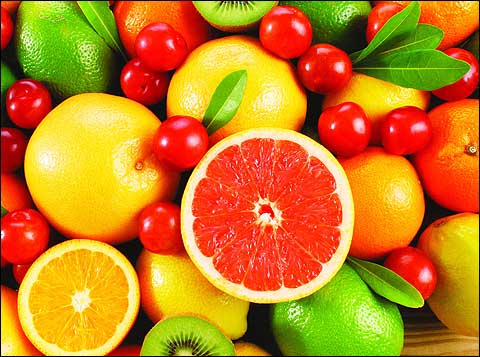(单词翻译:单击)
Think back to your most productive workday in the past week. Now ask yourself: On that afternoon, what did you have for lunch?
回想一下你在过去一周里最有效率的那个工作日,再问问自己:那天的午饭你吃了些什么呢?
When we think about the factors that contribute to workplace performance, we rarely give much consideration to food. For those of us battling to stay on top of emails, meetings, and deadlines, food is simply fuel.
当我们考虑影响工作场所表现的因素时,我们很少想到食物。自然,我们考虑得最多的是邮件、会议和截止日期什么的,食物嘛,只是简单的燃料罢了。

But as it turns out, this analogy is misleading. The foods we eat affect us more than we realize. With fuel, you can reliably expect the same performance from your car no matter what brand of unleaded you put in your tank. Food is different. Imagine a world where filling up at Mobil meant avoiding all traffic and using BP meant driving no faster than 20 miles an hour. Would you then be so cavalier about where you purchased your gas?
但事实是,这个类比是有误导性的。我们吃进的食物所产生的影响比我们意识到的要多。有了燃料,无论你往油箱里加的是什么牌子的无铅燃料,你大可期待你的车有相同的表现。食物就不太一样了,想象一下这样一个世界:在那里,用美孚润滑油就意味着能避免一切交通事故,用英国石油就意味着汽车会以每小时不超过20英里的速度行驶。这样你还会对你在哪里购买汽油这么漫不经心吗?
Food has a direct impact on our cognitive performance, which is why a poor decision at lunch can derail an entire afternoon.
食物对我们认知的表现有着直接的影响,这也就是为什么在午餐时作出一个糟糕的决定会让我们整个下午脱线。
Here’s a brief rundown of why this happens. Just about everything we eat is converted by our body into glucose, which provides the energy our brains need to stay alert. When we’re running low on glucose, we have a tough time staying focused and our attention drifts. This explains why it’s hard to concentrate on an empty stomach.
这里对这一现象有一个简要的解释。我们的身体会把我们吃的几乎所有东西转化成葡萄糖,而正是后者给我们大脑能量以保持活跃。当我们体内的葡萄糖含量过低的时候,我们就很难集中注意力。这也就是是为什么要把思想集中在一个空空如也的胃上面是如此的困难。
So far, so obvious. Now here’s the part we rarely consider: Not all foods are processed by our bodies at the same rate. Some foods, like pasta, bread, cereal and soda, release their glucose quickly, leading to a burst of energy followed by a slump. Others, like high fat meals (think cheeseburgers and BLTs) provide more sustained energy, but require our digestive system to work harder, reducing oxygen levels in the brain and making us groggy.
说到这儿,一切都很明白了。现在要说的是我们很少考虑到的部分:不是经过我们体内所有的食物都是以同样的比率被转化成葡萄糖。有些食物,比如说意大利面,面包,谷类食物和苏打点心等,会很快释放它们的葡萄糖,让你能量迅速增长但很快又回到低水平状态。而其他的呢,比如说高脂肪食物(肉饼啊,三明治之类)提供更加持续的能量,但是要求我们的消化系统更加努力运转,同时降低大脑中氧含量,让我们觉得昏昏沉沉。
Most of us know much of this intuitively, yet we don’t always make smart decisions about our diet. In part, it’s because we’re at our lowest point in both energy and self-control when deciding what to eat. French fries and mozzarella sticks are a lot more appetizing when you’re mentally drained.
我们中的大部分人直觉上了解大部分道理,但并没有做到在我们的饮食上作出聪明的决定。有部分原因是因为我们在决定吃什么的时候,我们正处于能量和自我控制的最低点。而当你没什么精神的时候,薯条和马苏里拉乳酪条当然看起来更加有吸引力。
Unhealthy lunch options also tend to be cheaper and faster than healthy alternatives, making them all the more alluring in the middle of a busy workday. They feel efficient. Which is where our lunchtime decisions lead us astray. We save 10 minutes now and pay for it with weaker performance the rest of the day.
不健康的午餐选择也会比健康的选择要便宜和快捷的多,这让它们在一个忙碌的工作日中间显得更加的诱人。它们看似更方便。这也是为什么我们的午餐选择会把我们带上歧途。我们这一刻节约了十分钟但用余下这一天的更加无力的表现来付出代价。
So what are we to do? One thing we most certainly shouldn’t do is assume that better information will motivate us to change. Most of us are well aware that scarfing down a processed mixture of chicken bones and leftover carcasses is not a good life decision. But that doesn’t make chicken nuggets any less delicious.
所以我们该做些什么呢?有一件我们一定不应该做的事是,假定会有更好的信息将会来使我们来改变。大部分人很明确的知道狼吞虎咽的吃掉加工后的鸡骨头和残余的鸡身的混合物不是个好的生活选择。但是这也不会使鸡块丧失一分美味。
No, it’s not awareness we need—it’s an action plan that makes healthy eating easier to accomplish. Here are some research-based strategies worth trying.
对,我们需要的不是意识——而是让健康饮食更能容易完成的行动计划。这里有一些基于调查基础上的方法值得一试:
The first is to make your eating decisions before you get hungry. If you’re going out to lunch, choose where you’re eating in the morning, not at 12:30 PM. If you’re ordering in, decide what you’re having after a mid-morning snack. Studies show we’re a lot better at resisting salt, calories, and fat in the future than we are in the present.
首先,在你感到饥饿之前就作出吃什么的决定。如果你外出午餐,早上就选好就餐地点,而不是拖到中午12:30。如果你在下订单,在早上上午的小吃之后决定你要吃什么。研究表明,我们在抵御将来的盐份、卡路里和脂肪上比在现在做得更好。
Another tip: Instead of letting your glucose bottom out around lunch time, you’ll perform better by grazing throughout the day. Spikes and drops in blood sugar are both bad for productivity and bad for the brain. Smaller, more frequent meals maintain your glucose at a more consistent level than relying on a midday feast.
另一个建议:与其选择让你体内的葡萄糖在午餐时间快要耗尽,你可以通过在一天中时不时的进食来表现得更好。血液中糖分的降低不仅对产出力不好,对大脑也是个伤害。相较于完全依赖于一个午间的大餐,少食多餐能够将你的葡萄糖保持在一个更加持续的水平。
Finally, make healthy snacking easier to achieve than unhealthy snacking. Place a container of almonds and a selection of protein bars by your computer, near your line of vision. Use an automated subscription service, like Amazon, to restock supplies. Bring a bag of fruit to the office on Mondays so that you have them available throughout the week.
最后,让健康的饮食比不健康饮食更容易得手。在你电脑旁、视线所及的范围内放一盒扁桃仁,蛋白条也是个好选择。使用诸如亚马逊之类的自动订阅服务来补充货源。在星期一带上一包水果到办公室,这样整个星期你都有水果可吃。
Research indicates that eating fruits and vegetables throughout the day isn’t simply good for the body—it’s also beneficial for the mind. A fascinating paper in this July’s British Journal of Health Psychology highlights the extent to which food affects our day-to-day experience.
研究表明,在一天中吃水果和蔬菜不只是对我们的身体好,同时也对我们的思维有利。《英国健康心理日报》五月中的一篇蛊惑人心的文章强调了食物影响我们每一天行为的程度。
Within the study, participants reported their food consumption, mood, and behaviors over a period of 13 days. Afterwards, researchers examined the way people’s food choices influenced their daily experiences. Here was their conclusion: The more fruits and vegetables people consumed (up to 7 portions), the happier, more engaged, and more creative they tended to be.
在这次研究中,参与者报告了他们在一个为期十三天的日程中的的食物消费、心情和行为。然后研究者们测试了人们的食物选择是如何影响他们的日常经历。这是他们的结论:人们每天吃越多的水果和蔬菜(最多有七份),他们就会越快乐,越投入,也越有创造力。
Why? The authors offer several theories. Among them is an insight we routinely overlook when deciding what to eat for lunch: Fruits and vegetables contain vital nutrients that foster the production of dopamine, a neurotransmitter that plays a key role in the experience of curiosity, motivation, and engagement. They also provide antioxidants that minimize bodily inflammation, improve memory, and enhance mood.
为什么呢?文章作者提供了几个理论。这其中有一个是当我们决定午餐吃什么的时候会习惯性忽略的直觉:水果和蔬菜包含有重要的能促进生化多巴胺产出的营养,而多巴胺在好奇心、动力和参与的体验扮演重要角色。它们也提供抗氧化剂使身体炎症最小化,提升记忆力,同时改善心情。
Which underscores an important point: If you’re serious about achieving top workplace performance, making intelligent decisions about food is essential.
这一切强调了一个重要的观点:如果你很认真的对待对于提升工作场所表现,那么对于食物作出理智的决定就很重要。
The good news is that contrary to what many of us assume, the trick to eating right is not learning to resist temptation. It’s making healthy eating the easiest possible option.
好消息是,与我们中大多数人所设想的相反,要吃的对的方法不是学着怎样抵挡诱惑,而是使健康饮食成为最简单可行的决定。


